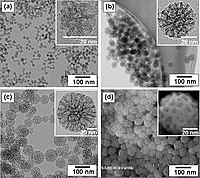
Photo from wikipedia
Acute kidney injury (AKI) has impacted a heavy burden on global healthcare system with a high morbidity and mortality in both hospitalized and critically ill patients. However, there are still… Click to show full abstract
Acute kidney injury (AKI) has impacted a heavy burden on global healthcare system with a high morbidity and mortality in both hospitalized and critically ill patients. However, there are still some shortcomings in clinical approaches for the disease to date, appealing for an earlier recognition and specific intervention to improve long-term outcomes. In the past decades, owing to the predictable base-pairing rule and highly modifiable characteristics, nucleic acids have already become significant biomaterials for nanostructure and nanodevice fabrication, which is known as nucleic acid nanotechnology. In particular, its excellent programmability and biocompatibility have further promoted its intersection with medical challenges. Lately, there have been an influx of research connecting nucleic acid nanotechnology with the clinical needs for renal diseases, especially AKI. In this review, we begin with the diagnostics of AKI based on nucleic acid nanotechnology with a highlight on aptamer- and probe-functionalized detection. Then, recently developed nanoscale nucleic acid therapeutics towards AKI will be fully elucidated. Furthermore, the strengths and limitations will be summarized, envisioning a wiser and wider application of nucleic acid nanotechnology in the future of AKI.
Journal Title: International Journal of Molecular Sciences
Year Published: 2022
Link to full text (if available)
Share on Social Media: Sign Up to like & get
recommendations!